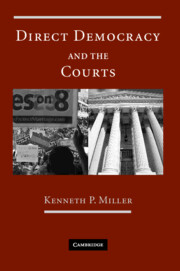Book contents
- Frontmatter
- Contents
- List of Tables and Figures
- Preface
- Introduction: A Clash of Rising Powers
- PART I THE QUEST FOR MAJORITY RULE
- PART II COUNTERING THE MAJORITY
- 3 The Counter-Majoritarian Power
- 4 The Courts at Work
- 5 Conflicts Over Rights
- 6 Conflicts Over Powers
- PART III THE MAJORITY STRIKES BACK
- Conclusion: A New Constitutional Equilibrium
- Appendix: Post-Election Initiative Invalidations
- References
- Index
- References
4 - The Courts at Work
Published online by Cambridge University Press: 05 June 2012
- Frontmatter
- Contents
- List of Tables and Figures
- Preface
- Introduction: A Clash of Rising Powers
- PART I THE QUEST FOR MAJORITY RULE
- PART II COUNTERING THE MAJORITY
- 3 The Counter-Majoritarian Power
- 4 The Courts at Work
- 5 Conflicts Over Rights
- 6 Conflicts Over Powers
- PART III THE MAJORITY STRIKES BACK
- Conclusion: A New Constitutional Equilibrium
- Appendix: Post-Election Initiative Invalidations
- References
- Index
- References
Summary
Have courts, in fact, countered direct democracy? The short answer is “yes,” but the full story is more complex. An accurate assessment requires us to consider the various ways courts have interacted with the initiative power. Courts have both defended the initiative process against various threats and taken a heavy toll on individual initiatives. This chapter begins by discussing how courts have often protected the initiative process, then turns to the litigation record to show how judicial review of individual initiatives has placed a strong check on the initiative power.
JUDICIAL PROTECTION OF THE INITIATIVE PROCESS
At crucial moments, courts have defended direct democracy from attack. Most importantly, courts protected the initiative process when the reformers first grafted it onto the representative system. By refusing to rule that direct citizen lawmaking violates the guarantee clause, the U.S. Supreme Court in Pacific States (1912) and several state courts defeated the constitutional challenge to direct democracy.
More recently, courts have struck down numerous attempts by state legislatures to “reform” – and thereby weaken – direct democracy. As we have seen, legislatures have sought to limit contributions to ballot measure campaigns, ban payments to signature gatherers, require petitioners to be registered to vote in the state, and limit the locations where petitioners can operate. If allowed to stand, these types of restrictions could seriously inhibit the exercise of direct democracy. But, the courts have frequently declared them void.
- Type
- Chapter
- Information
- Direct Democracy and the Courts , pp. 101 - 123Publisher: Cambridge University PressPrint publication year: 2009



